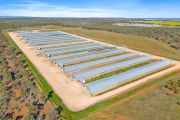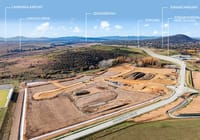
Cbus Property steps up as white knight for Sydney’s ‘Halo’ tower
One of Sydney’s most prominent CBD projects, which has been battling to stay afloat under a heavy debt load, may have found its white knight, as industry super fund developer Cbus Property enters talks to take it over.
The 55-storey office tower, proposed for the corner of Hunter and Pitt streets, shot to prominence with an ambitious plan for the 40,000 square-metre building to be constructed partly of timber. Were it to be built, the project – known as the Halo tower – would lay claim to being the world’s tallest such hybrid timber tower.

Equally ambitious was the developer behind the plan, Milligan Group, which accumulated over 70 individual titles to create a super-site across a new metro station being built in the heart of the CBD, to allow scope for such a landmark skyscraper.
But the plan brought with it considerable financial obligations, through backing from private credit lenders including Merricks Capital, which is owed more than $500 million, and a group of 60-odd investors who provided vendor financing when they sold their individual sites to Milligan.
As Milligan struggled to get moving on the project or bring on board a capital partner, its finances became stretched. Doubts arose over the estimated end value of the project at $1.8 billion, while planning delays and high construction costs held up progress.
The woes facing the proposed development of the Halo tower effectively turned a spotlight on the growing role played by the booming private credit sector in commercial real estate, and the risks involved when projects stalled. The corporate regulator has increased its scrutiny of the private sector, demanding greater transparency while warning that investors could lose money.
Underlining those concerns, in March the second-ranked lenders for the Halo project issued a default notice on their $31 million loan.
However, in what may yet prove to have been a turning point, the project’s main lender Merricks Capital increased its own loan by another $30 million earlier this year, despite its exposure on Halo contributing to its first monthly negative return in almost five years in December.
That top-up provided further funding for demolition at the site, boosting confidence it would go ahead and importantly created critical breathing room as Milligan looked to lock in an institutional investor.
ASX-listed developer Lendlease had previously signed a non-binding agreement to acquire the project for $685 million by the end of last year, but the mooted deal did not proceed.
Now, Cbus Property has stepped up to take on the project. Both Milligan and Cbus Property declined to comment on the progress of the negotiation and the financial arrangements are yet to be disclosed. Investment in the project would need to take into account its current financing, while reviewing its development potential and the forecast return.
But if a deal is concluded as expected, it will give Cbus Property control over one of the few development sites in the heart of Sydney that can supply new office space toward the end of this decade.
One result of the turmoil in the commercial real estate sector over the last three years is that the new supply of office accommodation is relatively limited, just as the top-tier tenants who typically occupy CBD towers are showing more interest in taking up more space.
As a result, a race for space in the city’s top towers has emerged, while second-class buildings with less amenity are being left behind by blue-chip tenants.
That in turn is fuelling interest from institutional investors to increase their exposure to major Sydney CBD buildings, where signs are emerging first of a long-awaited recovery.
One example of that is nearby on Pitt Street, where Mirvac has had success with a 55-storey development. Around a dozen law firms have pre-committed to space at 55 Pitt Street and a major Japanese investor has agreed to buy a two-thirds stake in that project for around $1.3 billion.
Another boost to sentiment in Sydney’s CBD market is imminent, with Australian fund manager Investa on track to strike a market-defining deal with US giant Blackstone, taking control of a $1.4 billion stake in Grosvenor Place.
As the rebound gains momentum, developers are looking ahead as well, including Cbus Property, which had leaned more heavily into its upmarket apartment pipeline as the office market went through the doldrums.
Also near the Halo development, a consortium including Lendlease, Mirvac and their partner, hospitality king Justin Hemmes, have emerged as the favourite to win another one of Sydney’s highly sought-after CBD developments, the Hunter Street metro station project.
At stake in that project are two towers, each of 50 storeys or more, which could deliver 150,000 square metres of commercial office space, potentially worth billions of dollars when developed.











